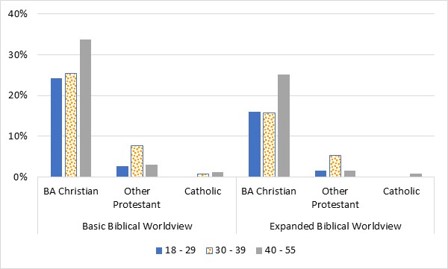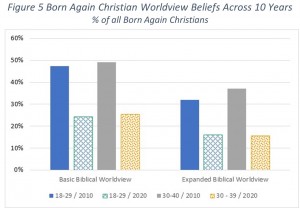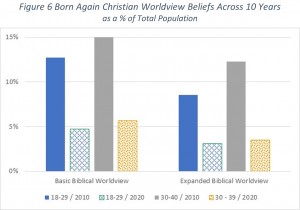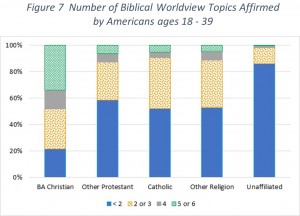The results are in from Probe’s newest assessment of the state of biblical beliefs in America 2020, and the news is not good.
Our 2020 survey reveals a striking decline in evangelical religious beliefs and practices over the last ten years. From a biblical worldview to doctrinal beliefs and pluralism to the application of biblical teaching to sexual mores, the number of Americans applying biblical teaching to their thinking has dropped significantly over this period. Unfortunately, the greatest level of decline is found among Born Again Protestants.
Our previous survey, the 2010 Probe Culturally Captive Christians survey{1}, was limited to Born Again Americans’ ages 18 through 40. This survey of 817 people was focused on a obtaining a deeper understanding of the beliefs and behaviors of young adult, Born Again Christian Americans.
Our new 2020 survey looks at Americans from 18 through 55 from all religious persuasions. Although still focused on looking at religious beliefs and attitudes toward cultural behaviors, we expanded the scope, surveying 3,106 Americans ages 18 through 55. Among those responses, there are 717 who are Born Again{2}, allowing us to make meaningful comparisons with our 2010 results while also comparing the beliefs of Born Again Christians with those of other religious persuasions.
Two questions were used in both surveys to categorize people as Born Again{3}. Those questions are:
1. Have you ever made a personal commitment to Jesus Christ that is still important in your life today? Answer: YES
2. What best describes your belief about what will happen to you after you die? Answer:
I will go to heaven because I confessed my sins and accepted Jesus Christ as my savior.
In our 2020 survey, we delve into what American’s believe regarding biblical worldview, basic biblical doctrine, pluralism and tolerance, religious practices, applications of religious beliefs to cultural issues, and more. In this first release, we lay the groundwork by explaining the trends in religious affiliation over time using a number of different surveys. Then we look deeper, examining how many of those of each religious faith group adhered to a biblical worldview in 2010 and now in 2020.
Laying the Groundwork: American Religious Affiliations Over Time
How have the religious affiliations of American young adults changed over the years? We have examined data over the last fifty years{4} to answer this question. From 1972 through the early 1990’s, the portion of the population affiliated with each major religious group stayed fairly constant. But since then, there have been significant changes. As an example, looking at data from the General Social Survey (GSS){5} surveys of 1988, 1998, 2010, and 2018 and our 2020 Religious Views survey, we see dramatic changes as shown in Figure 1. Note that the GSS survey asks, “Have you ever had a “born again” experience?” rather than the two questions used in the Probe surveys (see above). Looking at the chart it appears that the question used in the GSS surveys is answered yes more often than the two questions used by Probe.

Figure 1 – Religious Affiliations of Young Adults Over Time
As shown, the most dramatic change is the increase in the percentage of those who do not select a Christian affiliation (i.e., Other Religion and Unaffiliated). Looking at GSS data for those age 18–29, the percentage has grown from 20% of the population in 1988 to over 45% of the population in 2018. Most of this growth is in the number of Unaffiliated (those who select Atheist, Agnostic or Nothing in Particular). In fact, those from other religious faiths{6} grew from 7% to 10% over this time period while the Unaffiliated almost tripled from 13% to 35% of the population.
The Pew Research data (not shown in the graph) shows an even greater increase, growing from 27% in 1996 to 59% in 2020. The Probe data from 2020 tracks the GSS data, supporting the overall growth trend shown in the figure.
Looking at the Unaffiliated for the 30–39 age group, we see the same growth trend growing from 9% to 30%. Comparing the 18–29 data with the 30–39 data, we can determine that more people are transitioning to Unaffiliated as they mature. For example, we see that 26% of those in their twenties were Unaffiliated in 2010, growing to 30% of those in their thirties in 2018. This result means that more of the people in their twenties became Unaffiliated in their thirties. This result runs directly counter to the supposition of many that the growth in Unaffiliated will dissipate as young adults age and return to churches to raise their families.{7}
Considering the other religions shown in Figure 1, we see that the group seeing the greatest decline is Other Protestants, i.e. Protestants who did not profess to being born again. As shown, this group dropped by half (from 26% down to 13%) from 1988 to 2018. Similarly, those professing to be Catholics dropped by one quarter (from 24% to 18%) over the same time period.
In the GSS data, Born Again Protestants are remaining a relatively constant percent of the population. There has been a steady decline in those ages 18–29, but those in their thirties have not declined over this time period. This data appears to indicate that some young adults in their late twenties and early thirties are undergoing a “born again” experience.
However, while Born Again Protestants have remained stable, those who say they are affiliated with an Evangelical church have begun to decline somewhat. Pew Research surveys{8} of at least 10,000 American adults do show a decline in young adult Evangelicals from 28% in 2007 to 25% in 2014 to 20% in 2019.
Is a Christian Biblical Worldview Common Among Young Americans?
In assessing the worldview of people, we were not able to sit down and talk to them to fully understand their worldview. So, our 2010 and 2020 surveys include specific questions which help us identify someone with a Christian biblical worldview. A set of four questions is used to assess what we call a Basic Biblical Worldview. Two additional questions are added to get to a fuller assessment first used by the Barna Group. We use the six questions together to assess what we call an Expanded Biblical Worldview. The questions are as follows:
Basic Biblical Worldview
1. Which of the following descriptions comes closest to what you personally believe to be true about God: God is the all-powerful, all knowing, perfect creator of the universe who rules the world today.{9}
2. The Bible is totally accurate in all of its teachings: Strongly Agree
3. If a person is generally good enough or does enough good things for others during their life, they will earn a place in heaven: Disagree Strongly
4. When He lived on earth, Jesus Christ committed sins like other people: Disagree Strongly
Additional Beliefs for an Expanded Biblical Worldview
5. The devil or Satan is not a real being, but is a symbol of evil: Disagree Strongly
6. Some people believe there are moral truths (such as murder is always wrong) that are true for everyone, everywhere and for all time. Others believe that moral truth always depends upon circumstances. Do you believe there are moral truths that are unchanging, or does moral truth always depend upon circumstances: There are moral truths that are true for everyone, everywhere and for all time.

Figure 4 – Worldview Beliefs of 2020 Protestants
First, how do different Christian groups respond to these questions? In Figure 4, we show the percentage of each group in 2020 who have either a Basic Biblical Worldview or an Expanded Biblical Worldview. We use three groups of affiliations: Born Again Christians, Other Protestants, and Catholics.{10} On the left half of the chart, we indicate the percentage with a Basic Biblical Worldview by affiliation and age group. Those in the Born Again Christian group are at about 25% (about 1 out of 4) for those under the age of 40 and then jump up to 35% (about 1 out of 3) for those between 40 and 55. For those in the Other Protestant group, much less than 10% (1 out of 10) possess a Basic Biblical Worldview. Almost no Catholics possess a Basic Biblical Worldview. For both the Other Protestant group and the Catholics, the concept the vast majority do not agree with is that you cannot earn your way to heaven via good works. The other three questions are also much lower for Other Protestants and Catholics than for Born Again Christians.
Adding in the questions on Satan and absolutes for an Expanded Biblical Worldview, we see each group drop significantly. The Born Again Christian group runs about 15% below age 40 and 25% (or 1 in 4) from 40 to 55. The other two groups drop from almost none to barely any.
 Now let’s compare these 2020 results with the results from our 2010 survey. Figure 5 shows the results across this decade for Born Again Christians looking at the percent who agree with the worldview answers above. As shown, there has been a dramatic drop in both the Basic Biblical Worldview and the Expanded Biblical Worldview.
Now let’s compare these 2020 results with the results from our 2010 survey. Figure 5 shows the results across this decade for Born Again Christians looking at the percent who agree with the worldview answers above. As shown, there has been a dramatic drop in both the Basic Biblical Worldview and the Expanded Biblical Worldview.
If we compare the 18–29 result from 2010 with the 30–39 result from 2020 (i.e., the same age cohort 10 years later), we see a drop from 47% to 25% for the Basic Biblical Worldview and from 32% to 16% for the Expanded Biblical Worldview. So, the percentage of Born Again Christians with a Biblical Worldview (of either type) has been cut in half over the last decade. This result is a startling degradation in worldview beliefs of Born Again Christians over just 10 years.
 However, because the percent of the population who profess to being born again has dropped over the last ten years as well, the situation is even worse. We need to look at the percent of Americans of a particular age range who hold to a Biblical Worldview. Those results are shown in Figure 6. Once again, comparing the 18–29 age group from 2010 with the same age group ten years later now 30–39, we find an even greater drop off. For the Basic Biblical Worldview, we see a drop off from 13% of the population down to 6%. For the Expanded Biblical Worldview, the decline is from 9% down to just over 3% (a drop off of two thirds).
However, because the percent of the population who profess to being born again has dropped over the last ten years as well, the situation is even worse. We need to look at the percent of Americans of a particular age range who hold to a Biblical Worldview. Those results are shown in Figure 6. Once again, comparing the 18–29 age group from 2010 with the same age group ten years later now 30–39, we find an even greater drop off. For the Basic Biblical Worldview, we see a drop off from 13% of the population down to 6%. For the Expanded Biblical Worldview, the decline is from 9% down to just over 3% (a drop off of two thirds).
The drop off seen over this ten-year period is more than dramatic and extremely discouraging. In 2010, we had about 10% of the population modeling an active biblical worldview. Although small, 10% of the population means that most people would know one of these committed Christians. At between 6% and 3%, the odds of impacting a significant number of Americans are certainly reduced.
However, we cannot forget that the percent of biblical worldview Christians in the Roman Empire in AD 60 was much less than 1% of the population. Three hundred years later virtually the entire empire was at least nominally Christian. If we will commit ourselves to “proclaiming the excellencies of Him who called us out of darkness into His marvelous light,”{11} God will bring revival to our land.
Second, how do various religious groups stack up against these questions?
 Rather than look at the two biblical worldview levels discussed above, we will look at how many of the six biblical worldview questions they answered were consistent with a biblical worldview. In the chart, we look at 18- to 39-year-old individuals grouped by religious affiliation and map what portion answered less than two of the questions biblically, two or three, four, or more than four (i.e., five or six).
Rather than look at the two biblical worldview levels discussed above, we will look at how many of the six biblical worldview questions they answered were consistent with a biblical worldview. In the chart, we look at 18- to 39-year-old individuals grouped by religious affiliation and map what portion answered less than two of the questions biblically, two or three, four, or more than four (i.e., five or six).
You can see that there are three distinct patterns. First, Born Again Christians where almost half of them answered four or more questions from a biblical perspective (the top two sections of each bar). Then, we see Other Protestants, Catholics{12}, and Other Religions{13} chart about the same, with over half answering zero or one and very few answering more than three.
Finally, we see that the Unaffiliated have over 85% who answer zero or one. This result is one of many we have identified over the years, clearly showing that the Unaffiliated are not active Christians who do not want to affiliate with a particular group. Some have suggested this possibility, but the data does not support that hopeful concept.

Figure 8 – What Do You Personally Believe to be True About God?
Third, what do they say about God and His relationship to the world?
People have many different views of God or gods in this life. In this chart, we look at how 18-to 39-year old respondents define God across the different religious affiliations used in the prior chart. Our respondents were asked: Which of the following descriptions comes closest to what you personally believe to be true about God? They were given the following answers to choose from (without the titles).
1. God Rules: God is the all-powerful, all-knowing, perfect creator of the universe who rules the world today.
2. Impersonal Force: God refers to the total realization of personal human potential OR God represents a state of higher consciousness that a person may reach.
3. Deism: God created but is no longer involved with the world today.
4. Many gods: There are many gods, each with their different power and authority.
5. No God: There is no such thing as God.
6. Don’t Know: Don’t know
Once again, the answers fall into three groups. A vast majority of Born Again Christians (~80%) believe in a creator God who is still active in the world today. It is somewhat surprising that over 20% ascribe to a different view of God. The second group consists of Other Protestants who do not claim to be born again, Catholics and Other Religions. These groups are remarkably similar in their responses with around 40% who believe in an active, creator God. So, the remaining 60% have a different view. The third group are the Unaffiliated with less than 10% professing belief in an active, creator God. Over 50% believe in no God or they just don’t know. Overall, only about one third of Americans 55 and under believe in an active, creator God. We must admit that America is not a Judeo-Christian nation as the belief in God is central to Judeo-Christian views. From an evangelistic viewpoint, one needs to be prepared to explain why someone should believe in a creator God. The Probe Ministries website, www.probe.org, is an excellent place to explore the topic.{14}
Summary
This document begins the process of understanding the status and trends of religious beliefs and behaviors in the America of this third decade of the twenty first century. Several findings addressed above are worth highlighting in summary.
• Unaffiliated Americans continue their growth toward one half of the population which began before the turn of this century. The current number of young adults (under the age of 40) who are unaffiliated ranges between one third and one half of our population.
• The percentage of young adult Americans who claim to be Born Again Protestants has declined slightly among the youngest group (18–29) but has remained fairly constant during this century.
• Other Protestants and Catholics have seen marked declines during this century. The percentage of young adult Other Protestants has dropped by one half (from about one quarter of the population to about one eighth) since 1988.
• Born Again Christians are the only group to have a significant number of adherents who profess to having a Basic Biblical Worldview. This worldview is measured by the answers to four very basic questions at the heart of Christian doctrine. Even among this group, only about one in four (25%) of them hold to a Basic Biblical Worldview.
• Over the last ten years, the number of young adult (18–39) Born Again Christians with a Basic Biblical Worldview has dropped by two thirds from almost 15% of the population down to about 5%. This is a remarkable and devastating drop in one decade.
• Just under one half of Born Again Christians agree with more than three of the six worldview questions. Amongst other Christian groups and the population as a whole less than one in ten do so.
• Overall, only about one third of Americans 55 and under believe in an active, creator God.
In our next release, we will look at how American young adults
• react to the doctrine of Jesus Christ,
• believe that Jesus is the only path to heaven, and
• have a classic view of tolerance.
In the meantime, be in prayer about what you can do in your sphere of influence to stem the trends listed above.
Notes
1. For a detailed analysis of the outcomes of our 2010 survey and other surveys from that decade, go to our book Cultural Captives: The Beliefs and Behavior of American Young Adults.
2. The 717 respondents equated to 747 equivalent people when weighted to adjust for differences between those surveyed and the distribution of gender, ethnicity, ages, and location as given by the United States Census Bureau.
3. Our 2010 survey was facilitated by the Barna Group and I would presume they commonly use these two questions in other surveys to identify born again Christians.
4. We have looked at religious affiliation from Pew Research, GSS, PALS, Barna Group and others.
5. General Social Survey data was downloaded from the Association of Religion Data Archives, www.TheARDA.com, and were collected by the National Opinion Research Center.
6. Note that the Other Religions category includes Christian cults (e.g. Mormon, Jehovah’s Witnesses), Jews, and other world religions.
7. In future releases, we will also see that the Unaffiliated are very unlikely to hold to basic Christian beliefs.
8. U.S. Religious Landscape Survey 2007, U.S. Religious Landscape Survey 2014, Religious Knowledge Survey 2019 Pew Forum on Religion & Public Life (a project of The Pew Research Center). The Pew Research Center bears no responsibility for the analyses or interpretations of the data presented here. The data were downloaded from the Association of Religion Data Archives, www.TheARDA.com, and were collected by the Pew Research Center.
9. Other answers to select from: God created but is no longer involved with the world today; God refers to the total realization of personal human potential; there are many gods, each with their different power and authority; God represents a state of higher consciousness that a person may reach; there is no such thing as God; and don’t know.
10. Born Again Christians include Catholics who answered the born again questions to allow comparison with the 2010 survey but in the Catholic category we include all Catholics including those who are born again.
11. 1 Peter 2:9
12. Catholics here include about 20% who profess to be born again. That subset is included in both the BA Christian column and the Catholic column in Figure 7 and Figure 8.
13. One of the reasons that Other Religions include some that answer more than three worldview questions is that Mormons and other Christian cults are included in that category.
14. Articles on our website addressing this topic include Evidence for God’s Existence, There is a God, Does God Exist: A Christian Argument from Non-biblical Sources, The Impotence of Darwinism, Darwinism: A Teetering House of Cards, and many others.
©2021 Probe Ministries